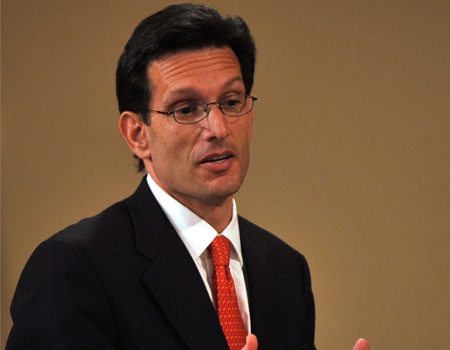House Majority Leader Eric Cantor (R-VA) is striking a gentler tone ahead of President Obama’s Thursday jobs speech, and highlighting the areas he says Republicans can work with the administration to grow the economy — unemployment insurance, payroll taxes, and infrastructure. But the devil is in the details, and there are still significant differences between the parties’ approaches.
“I’m wary of the suggestion of an infrastructure bank,” House Majority Leader Eric Cantor (R-VA) told reporters at a roundtable lunch hosted by the Christian Science Monitor. “I am one who agrees with the notion that an infrastructure bank is almost like creating a Fanny and Freddie for roads and bridges.”
That’s President Obama’s favored infrastructure spending idea — to loan both private and public dollars to states and municipalities to speed up new and existing building projects, and to lure private investment with the promise of returns from tolls and other fees. Cantor’s counter offer is to nix the requirement that states “set aside 10 percent of federal surface transportation funds for transportation museums, education, and preservation would allow states to devote these monies to high-priority infrastructure projects, without adding to the deficit.”
These are pretty different ideas, though they could meet similar ends in some circumstances. The infrastructure bank wouldn’t require canceling some projects (mainly for bikers and pedestrians) to fund different ones, and would fund projects that meet high bang-for-the-buck, and environmental standards.
Jared Bernstein — an economist at the Center on Budget and Policy Priorities and Vice President Joe Biden’s former top economic adviser — told TPM, “the [infrastructure] bank has real advantages in terms of rigorous cost benefit analysis in choosing projects that this idea doesn’t sound like it would…. but 10 percent isn’t a lot and this kind of flexibility can be a useful thing I would just want to know what kind of criteria the project choice involves. Because the last thing we want to do is waste these scarce resources.”
The new tone may mask underlying differences, but they still exist.










